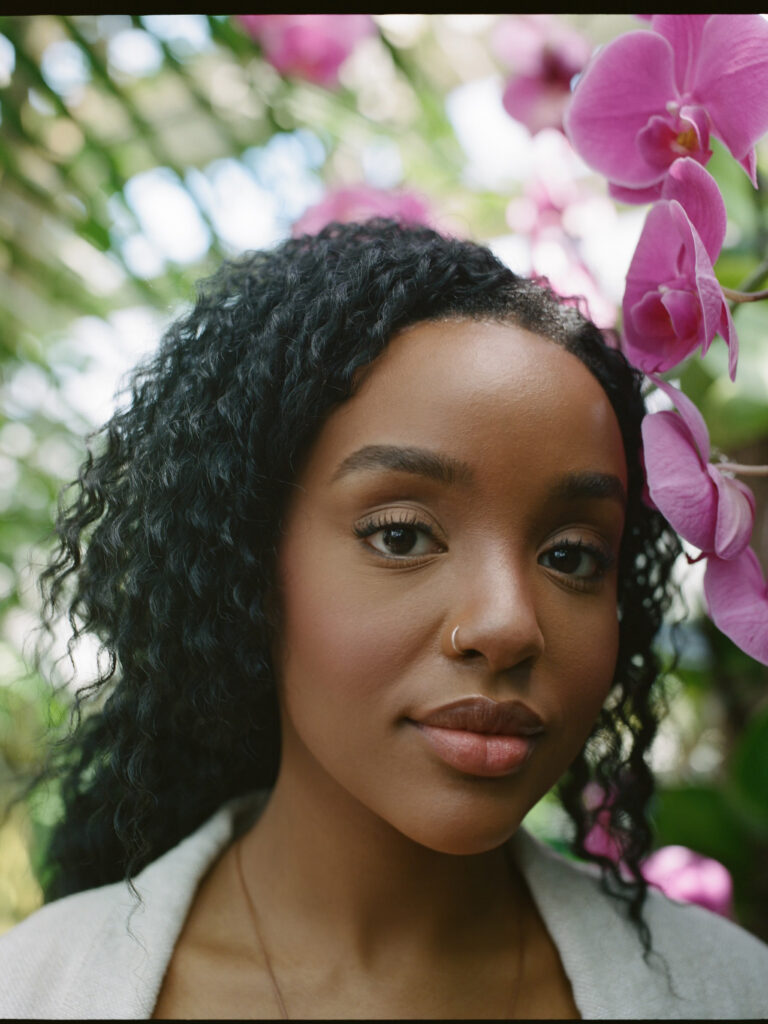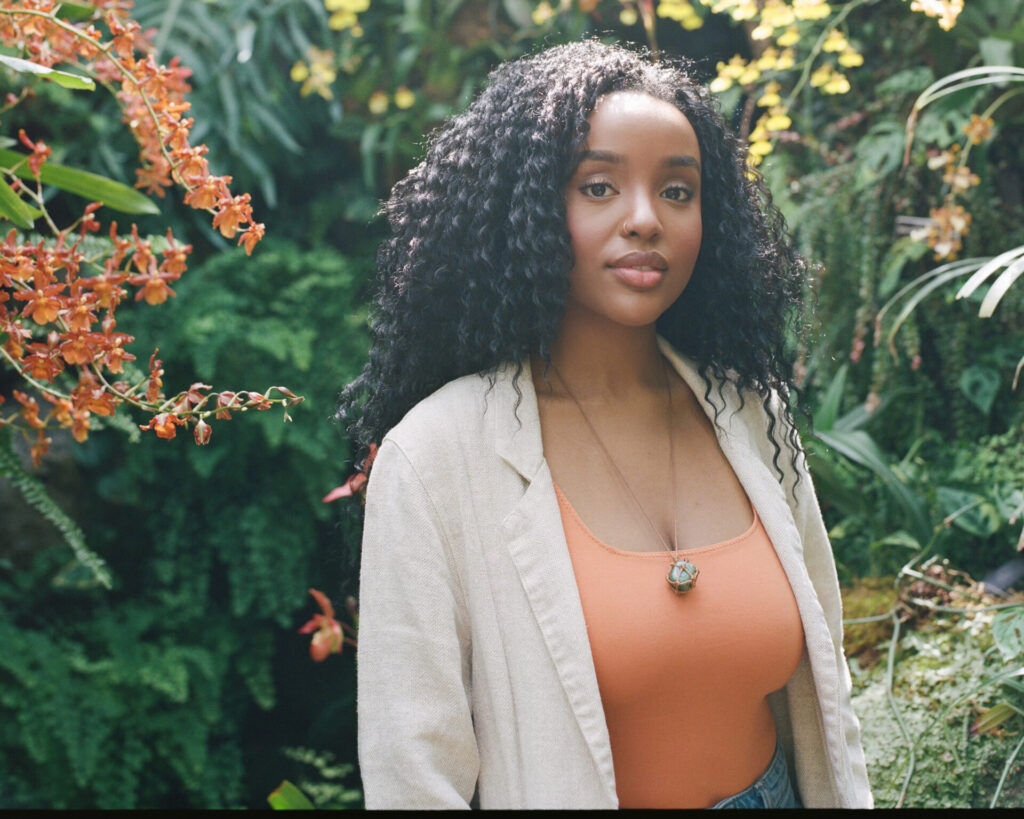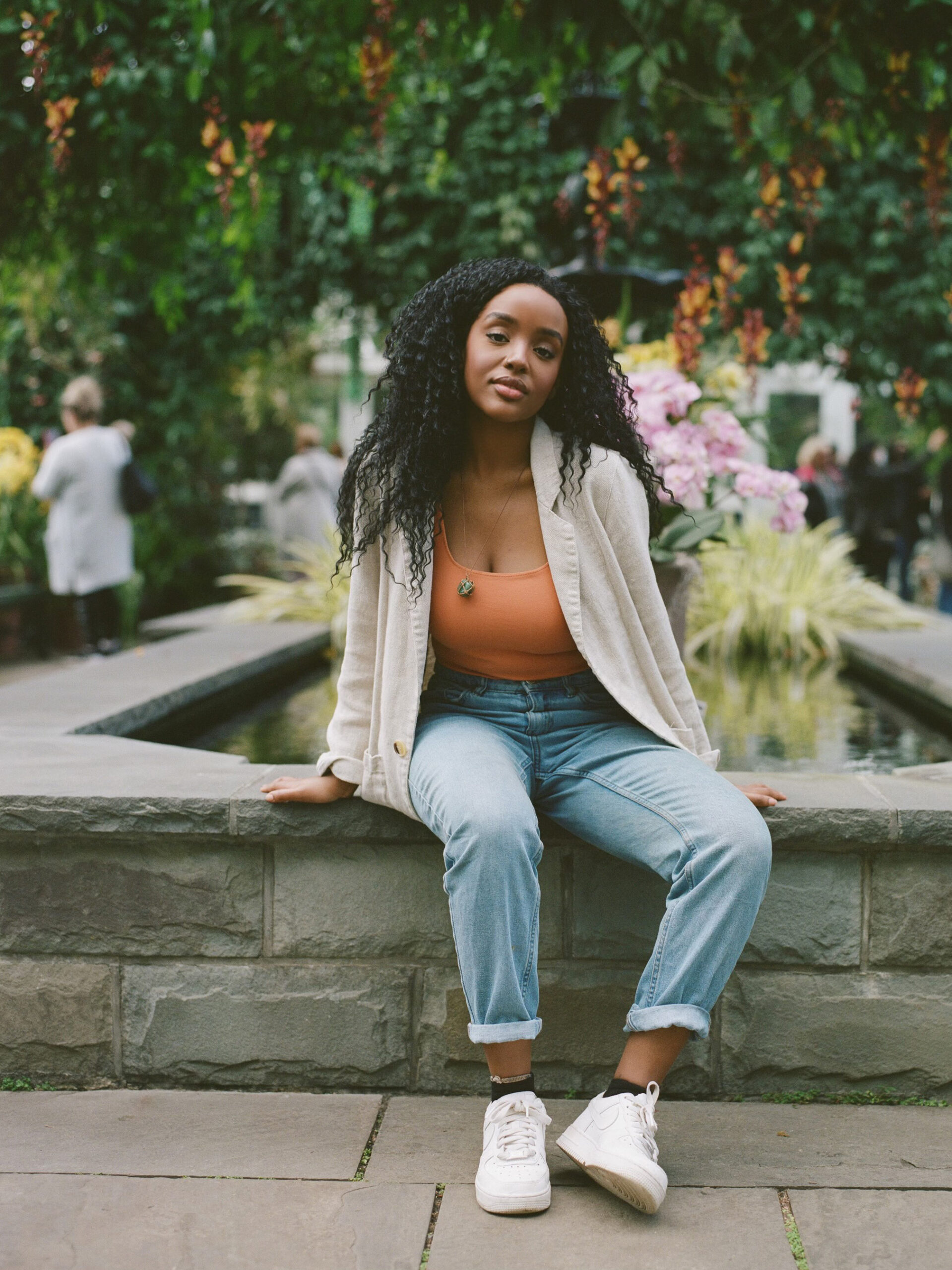Wawa Gatheru speaks for the planet.
The 25-year-old climate activist entered the spotlight back in 2019 as the first Black person to earn the Rhodes, Truman, and Udall scholarships for her work in environmental justice. Frustrated by a lack of diversity and youth inclusion in the movement, she founded Black Girl Environmentalist from her childhood bedroom. Now one of the largest youth-led organizations in the U.S., it’s a powerful platform uniting Black girls, women, and gender-expansive folks to build a more just and sustainable future.
Gatheru’s mission is simple: ensuring the people hardest hit by climate change have a voice in shaping its solutions. It’s also ambitious, considering Black people make up just 10 percent of senior staff of NGOs, despite being disproportionately impacted by environmental injustice. But amid a daunting crisis and insular leadership, she’s the driving force of change that’s keeping hope alive and reminding us that we can take action.
Part of her solution is to make it easier for young women of color, especially from low-income backgrounds, to get their foot in the (green) door—a 2023 LinkedIn study finds only 1 in 10 women globally have a green skill, even though we’re increasingly more vulnerable to the impacts of climate change than men.
“As executive director, there’s a lot of work I have to do to share our message, our programming, our proof of concepts,” Gatheru tells Sweet July. Her voice is calm and measured, but it’s clear she stands on business. “Telling your stories is a beautiful way to change hearts.”
Gatheru’s own story is inspirational. Her “very rural beginnings” established a deep respect for the natural world. The daughter of Agĩkũyũ Kenyan immigrants, she grew up in the Quiet Corner, an area of Northeast Connecticut known for its rich agricultural history and picturesque New England landscape. Farmers fill both sides of her family lineage.
“All my earliest memories are of watching my mom and grandmother tend to land, grow vegetables, and somehow transform them into Kenyan cuisine,” adds Gatheru, dreamily. “They’d be elbows deep in the soil and my grandmother would tell me tales about the earth, and how the trees were singing. It created a genuine love for the environment that connected to my heritage.”
Her tiny hometown of Pomfret had one stop light and no grocery store. There wasn’t a high school, either, so Gatheru attended nearby Woodstock Academy with students from the area. She planned to become a doctor—“As a child of immigrants, you have three options: doctor, engineer, lawyer,” she says—but during her junior year, fate intervened. Gatheru stumbled into an environmental science class, and fell hard.
“I had never been so genuinely interested in anything,” says Gatheru.

So she set out to learn everything she could about the people rising up in the face of environmental racism and injustice. She’d also find out that emigrating to the U.S. was a way for her own parents to escape a climate crisis. “They were the first generation to grow up in the midst of a 40-year drought in the Horn of Africa that is ravishing people’s livelihoods,” she explains. “Families like mine, who’ve been farmers for as long as we’ve understood who we are, are not able to have the same type of crop yields. Food insecurity, hunger…these are things they now experience more frequently.”
Gatheru began understanding how the climate crisis disproportionately impacted people of color, and “connecting the dots” from her parents’ experience. “Over half of my family that immigrated here has asthma,” she says. “I recognized that we’re not being adequately taught about these things, nor are we being truthfully told about how we contribute.”
For Gatheru, it was deeply personal—the kind of trenchant awareness that tugs at your gut and compels you to make a choice. “I couldn’t focus on anything that wasn’t climate,” she says. “I promised myself there, when I was 15, that I was going to dedicate my life to environmental justice.”
She stuck to that vow: While attending the University of Connecticut, she established Youth Climate Lobby Day, bussing in more than 100 young people to lobby legislators on the importance of integrating climate education in the K-12 system (in 2022, Connecticut became an early state to do so). Gatheru’s efforts resulted in UConn becoming the first public university in the country to require environmental general education. Recognizing the link between climate issues and social ills, she also co-founded the UConn Access to Food Effort (UCAFE) and conducted the first-ever assessment on food insecurity for college students. Her research led to a state law mandating the evaluations at public universities and caught the attention of Connecticut senator Chris Murphy, who introduced a similar bill at the federal level.
But during her senior year, the COVID-19 pandemic hit, leaving Gatheru confused about how to continue using her voice without being able to collaborate IRL.
“I identified [myself] as an organizer; meeting my legislators, coming together with tons of young people, and figuring out next steps,” she says. “[During the pandemic], I was stuck in my childhood bedroom, not knowing what the next step was. So I decided to write.”
Cut to her viral Vice op-ed that sparked a crusade for highlighting how environmental studies are erasing Black people. Gatheru says she received hundreds of messages after it was published. “The ones that stuck out most were from other Black women saying that it was the first time they had seen their stories represented.” Gatheru hosted a Zoom event—“Calling all Black women environmentalists!”—and more than 80 people joined from around the world, hungry for community.
As it turns out, this “light bulb moment” of connection was the foundation for something bigger. It planted the seeds for Black Girl Environmentalist, which evolved into an Instagram account for women to keep meeting in the comments, and during virtual happy hours, yoga classes, and panels. After graduating from Oxford with a MS in Nature, Society and Environmental Governance, she felt she had “a once in a lifetime chance” to turn BGE into a full-fledged nonprofit, a plan that would come with sacrifices.
“I turned down what was then my dream job and dream salary—much to my parents’ dismay—and said I was giving myself one year to build this out, to create a business plan, to fundraise,” says Gatheru. “If I wasn’t able to do it, I’d go crawling back to that job and beg.”
There was no begging necessary. In late 2022, BGE blossomed into a completely developed nonprofit, led by an “amazing” team of young Black women. There are more than 1,000 members and a national presence—12 hubs in cities like Atlanta, New Orleans, LA, and NYC; mentorship programs, educational workshops, and networking events; and their Hazel M. Johnson Fellowship (named for the “mother of environmental justice”), which places Black students and recent grads in green internships from fashion to climate tech to renewable energy.
“There’s no one else like us doing that work,” says Gatheru, speaking to the way BGE fills a critical need for the next generation of Black women to get paid, gain experience, and forge a future in the white, male-dominated green economy. With growth comes shine, and Gatheru and BGE are getting lots of it. She’s been featured in The New York Times, landed a Vogue cover alongside singer Billie Eilish and seven other climate activists, and in 2024, she made Forbes’ “30 Under 30” list.

“I’m going to do this with the accolades or not,” says Gatheru, but she’s grateful that the public awareness gives her a bigger stage to spread the word about BGE and shed light on hard-fought climate wins. In the environmental justice (EJ) space, grassroots victories—especially those led by communities of color—struggle for national attention. Gatheru recalls the recent halt of liquified natural gas terminals in the Gulf South, the home of “Cancer Alley” and a region pivotal for fossil fuel divestment.
“There was a huge win led by Black women who galvanized enough attention that the Biden administration issued a temporary pause,” she says. “Now we need more support, so it can turn into a permanent solution. What happens in the Gulf has ramifications for how we all experience the future; unfortunately, that connection hasn’t been made.”
By 2025, Gatheru’s generation will make up 27 percent of the workforce, and they want to work for climate-friendly companies. In fact, 55 percent research a company’s environmental impact and policies before even accepting a job, and 17 percent have quit because of concerns. “Across industries, you have young people declining offers, or not even applying, because of a lack of ESG or sustainability perimeters,” says Gatheru. “They don’t want to spend their time with companies that greenwash.”
Gen Z also happens to be highly skeptical of youthwashing—when brands use young people or “youth voices” to make themselves look more environmentally conscious than they actually are. Gatheru gets heated, stressing that the tactic is “embarrassing” and more importantly, doesn’t work.
“We aren’t given enough credit for our media literacy,” she continues. “That’s my hot take. We see a lot of industries that couldn’t care less about young people: we see it in their organizations, in the way that they pay or don’t pay…we see it in fast fashion companies with toxins in their products. If a company cared about you, they would not put cancer-causing materials and chemicals in your furniture or clothes.”
After a decade in EJ, Gatheru believes the conversations are finally getting more nuanced. She’s doing her part to ensure steady progress continues, with a seat on several boards and advisory councils, including the Environmental Media Association, Climate Power, Sound Future, and EarthJustice. She’s also an inaugural member of the National Environmental Youth Advisory Council of the EPA, the first of its kind in US history.
“The only way you don’t feed into youthwashing is listening to young people, putting us in tangible spaces of influence, and seeing us as meaningful collaborators, not replaceable pawns,” she says. “We’re people and we deserve to be valued as such.”
Gatheru’s vision for the future is purposefully open-ended. She now recognizes that the best opportunities often come unexpectedly, and wants to remain adaptable. Her dream is to see such strong representation in the environmental workforce that BGE is no longer needed.
“There’s so much climate doomism and eco-anxiety that many of us experience, including myself,” says Gatheru. However, she insists that “there are wins happening every day,” and if people knew about them, they’d have a more optimistic outlook. One of her plans is to create a documentary on Black women leading the charge in the Gulf South; real-life examples of how people are making a difference in their communities, so others can see that it’s possible to be changemakers, too.
Gatheru is also determined to recognize EJ pioneers who haven’t gotten the credit they deserve. She cites a 1979 study from Dr. Robert D. Bullard, a Black scientist who was first to link race and exposure to pollution. The data still rings true, but Bullard isn’t on any Vogue covers. “I want to use my voice to lift up the people that have laid the path for me…and push for them to receive their flowers,” Gatheru says.
Saving the planet can be grueling, so Gatheru has to be intentional with her energy. Now based in Philly, where she lives with her partner and two cats, she’s re-evaluating the concept of downtime. In the past, rest was reactive; taking a nap or going for a walk when she was overwhelmed, for example. These days, it means branching out and trying something new—making music, recording a silly video, or taking a pottery class—without a specific outcome attached. She emphasizes, “It’s okay to do the thing just to do the thing.”
That said, Gatheru reveals her “big, big life goal” is to own an animal sanctuary. Maybe she’ll try her hand at farming?
“I don’t have much of a green thumb, unfortunately,” she says. “I missed that family trait.”
That may be true, but Wawa Gatheru still carries her ancestors’ legacy. Just as generations before her tended the earth, she’s cultivating a different kind of growth: a movement rooted in justice and inclusivity.







